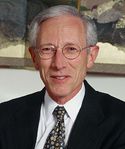History of the Jews in Zambia: Difference between revisions
Chalochatu (talk | contribs) |
Chalochatu (talk | contribs) No edit summary |
||
| Line 3: | Line 3: | ||
==Summary== | ==Summary== | ||
[[File: | [[File:Stanley_Fischer.jpg|thumb|right|125px|[[Stanley Fischer]] was born into a Jewish family in what is now Zambia.]] | ||
Many [[Jews]] came to [[Zambia]] (previously called [[Northern Rhodesia]]) in order to achieve economic prosperity, first settling in [[ | Many [[Jews]] came to [[Zambia]] (previously called [[Northern Rhodesia]]) in order to achieve economic prosperity, first settling in [[Livingstone]] and Broken Hill.<ref name="jewishvirtuallibrary1"/> Some of the first Jews in Zambia were prominent in the [[cattle]] production and [[copper mining]] businesses.<ref name="jewishvirtuallibrary1"/><ref name="worldjewishcongress1">{{cite web|url=http://www.worldjewishcongress.org/en/communities/show/id/81 |title=Zambia |publisher=World Jewish Congress |date= |accessdate=2013-08-01}}</ref> Livingstone already had a permanent Jewish congregation of 38 members by 1905, with the first [[Jewish wedding]] in Zambia taking place in 1910.<ref name="jewishvirtuallibrary1"/> Later on, many Zambian Jews achieved great success in the ranching industry and in the iron foundries.<ref name="jewishvirtuallibrary1"/><ref name="worldjewishcongress1"/> 110 Jews lived in Zambia (with a majority of them living in Livingstone and [[Lusaka]]) in 1921, and this population increased over the next couple of decades.<ref name="jewishvirtuallibrary1"/> Some Jewish [[refugees]] came to Zambia before<ref name="autogenerated1"/> and after the [[Holocaust]], with the Jewish population of Zambia peaking at 1,000<ref name="autogenerated1"/> to 1,200 in the mid-1950s (by which point "the center of Jewish life had shifted to Lusaka, the [[copperbelt]] center of the country").<ref name="jewishvirtuallibrary1"/> Many Jews left Zambia and [[Immigration|immigrated]] to other countries in the 1960s, with only 600 Jews remaining in Zambia in 1968.<ref name="jewishvirtuallibrary1"/> Jews were active and prominent in [[Politics of Zambia|Zambian politics]] before Zambia [became independent in 1964.<ref name="jewishvirtuallibrary1"/> The Council for Zambia Jewry was created in Lusaka in 1978 "to oversee Jewish communal activities."<ref name="jewishvirtuallibrary1"/> This council also "provides assistance to political refugees and the poverty-stricken with medical and financial aid."<ref name="jewishvirtuallibrary1"/> Only about thirty-five Jews currently live in Zambia, with almost all of them living in Lusaka.<ref name="jewishvirtuallibrary1"/> The Zambian Jewish community did not have a rabbi for several years by this point in time.<ref name="jewishvirtuallibrary1"/> One of the more notable Zambian Jews is [[Simon Zukas]], "who played a key role in Zambia's struggle for independence from Britain in the 1950s, and went on to be a government minister after independence."<ref name="autogenerated1"/> | ||
==References== | ==References== | ||
<references/> | |||
{{Africa topic|History of the Jews in}} | {{Africa topic|History of the Jews in}} | ||
Revision as of 08:07, 2 June 2016
The Jews in Zambia were always a small community with a notable role in Zambian history.[1][2]
Summary

Many Jews came to Zambia (previously called Northern Rhodesia) in order to achieve economic prosperity, first settling in Livingstone and Broken Hill.[1] Some of the first Jews in Zambia were prominent in the cattle production and copper mining businesses.[1][3] Livingstone already had a permanent Jewish congregation of 38 members by 1905, with the first Jewish wedding in Zambia taking place in 1910.[1] Later on, many Zambian Jews achieved great success in the ranching industry and in the iron foundries.[1][3] 110 Jews lived in Zambia (with a majority of them living in Livingstone and Lusaka) in 1921, and this population increased over the next couple of decades.[1] Some Jewish refugees came to Zambia before[2] and after the Holocaust, with the Jewish population of Zambia peaking at 1,000[2] to 1,200 in the mid-1950s (by which point "the center of Jewish life had shifted to Lusaka, the copperbelt center of the country").[1] Many Jews left Zambia and immigrated to other countries in the 1960s, with only 600 Jews remaining in Zambia in 1968.[1] Jews were active and prominent in Zambian politics before Zambia [became independent in 1964.[1] The Council for Zambia Jewry was created in Lusaka in 1978 "to oversee Jewish communal activities."[1] This council also "provides assistance to political refugees and the poverty-stricken with medical and financial aid."[1] Only about thirty-five Jews currently live in Zambia, with almost all of them living in Lusaka.[1] The Zambian Jewish community did not have a rabbi for several years by this point in time.[1] One of the more notable Zambian Jews is Simon Zukas, "who played a key role in Zambia's struggle for independence from Britain in the 1950s, and went on to be a government minister after independence."[2]
References
- ↑ 1.00 1.01 1.02 1.03 1.04 1.05 1.06 1.07 1.08 1.09 1.10 1.11 1.12 Lua error in ...ribunto/includes/engines/LuaCommon/lualib/mwInit.lua at line 23: bad argument #1 to 'old_ipairs' (table expected, got nil).
- ↑ 2.0 2.1 2.2 2.3 Lua error in ...ribunto/includes/engines/LuaCommon/lualib/mwInit.lua at line 23: bad argument #1 to 'old_ipairs' (table expected, got nil).
- ↑ 3.0 3.1 Lua error in ...ribunto/includes/engines/LuaCommon/lualib/mwInit.lua at line 23: bad argument #1 to 'old_ipairs' (table expected, got nil).